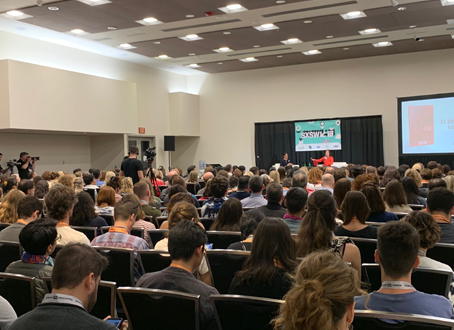Special thanks to Ramya Tallapragada, intern with the Case Foundation, for her contributions to this blog.
In the years since the Case Foundation became a champion for Impact Investing, the movement has really taken off. In the U.S. and around the world, there has been a flurry of activity among traditional investors, policymakers, philanthropists and researchers. We’ve seen traditional investors begin to realize the value of private capital deployed for good, without the need to sacrifice profit. We’ve seen concerted efforts from the social sector to build necessary infrastructure for the Impact Investing and social enterprise community. We’ve seen government catalyze progress by enacting policy changes to increase the amount of capital available for good. We’ve seen impact investments empower entrepreneurs with transformative ideas to solve real world problems.
The Impact Investing movement also stands out in another important way: women are emerging as a driving force behind its growth—as investors, as entrepreneurs and as leaders of the movement. A recent NASDAQ piece notes that women are spearheading and populating this sector more so than any other financial services sector. I suppose there are a host of reasons why this is, but I particularly like a quote by Jackie VanderBrug of U.S. Trust in this article:
“I wouldn’t want to say it’s pink, but it has been a field where, philosophically, women have led. Part of that is because women have a more holistic view of investment. Yes, they do care about returns, but they also care about the role of their investments in society. It’s partly because they are looking for more opportunities to differentiate themselves. And it’s partly because they are looking to meet objectives beyond the benchmarks.”
A recent Calvert Investments report asserts that women, along with younger investors, will drive the growth of Impact Investing. In a study of affluent women, Calvert found that 95 percent ranked “helping others” and 90 percent ranked “environmental responsibility” as important. Women have also demonstrated that they often make purchasing decisions based on their personal values. Still, only 4 percent said that they understood how to make investments that align with their values. 70 percent did not know about sustainable or responsible investing.
While business and investing continues to focus on boomers, this data shows the importance of ensuring that women are aware of Impact Investing strategies. Remember, their purchasing power and, therefore, their potential social impact power is enormous—women control 39 percent of investible assets in the U.S. That number will continue to rise, as 50 percent of private wealth in the U.S. will be in the hands of women by 2020. And, amongst that group, it’s worth keeping an eye on Generation X and Millennials set to inherit $41 trillion of wealth over the next 40 years, with a higher degree of millennial women who are educated and look to have decision making power (vs. their male counterparts).
Education about opportunities and the how-to’s of Impact Investing remain an essential component of leveraging the impact of women in Impact Investing. Activating more investment dollars into the space is what’s required to tip the movement from niche concept to mainstream investment strategy. And typically in the early stages of movement catalyzing, we require some “Be Fearless” actors just “doing it” as we say in our Short Guide to Impact Investing.
Here are some of the fearless women leading the charge. It’s by no means comprehensive, but rather a spotlight on the mix of players from philanthropy, the investment community, the financial services industry and government:
In Philanthropy:
- I would be remiss not to start with our own Jean Case*. She is an avid champion of the concept of putting private capital to public good. Her work on the U.S. National Advisory Board for Impact Investing helped craft a hugely successful coalition of change agents around a collective policy agenda. And she remains one of the most powerful influencers in the field, as an advocate, an ecosystem builder and an investor.
- Clara Miller*, after assuming leadership of the Heron Foundation in 2010, has led the foundation’s effort to deploy all of its assets towards its mission, breaking down the traditional method of giving within the organization and ensuring that Impact Investing was totally integrated into the foundation’s operations and mission.
- Debra Schwartz* has led the MacArthur Foundation’s Impact Investing arm for 15 years, directing capital to improving affordable rental housing across the U.S.
- Laura Arnold, co-Chair of the Laura and John Arnold Foundation, is a leading advocate and supporter of Pay for Success, a potential break-through financing scheme for social ventures.
- Kimberlee Cornett*, Managing Director of The Kresge Foundation’s Social Investment Practice, spearheads the foundation’s effort to identify and fill gaps in funding for enterprises in economically stressed communities using a strategic combination of grant making and investing.
- Paula Goldman, Vice President and Global Lead for Impact Investing at Omidyar Network, is a critical thought-leader and movement builder in the space. And Omidyar Network’s early movement in the Impact Investing arena and continued big bets in the space continue to pave the way for future followers.
In the Investment Community:
- Nancy Pfund, Managing Partner of DBL Partners, is a venture capitalist that has proven that striving for a double bottom line can be profitable for investors and companies. Her current fund has committed to making early investments in companies to not only facilitate impact, but also encourage the integration of impact into corporate culture and operations.
- Deborah Winshel of BlackRock Impact is transforming the way the traditional investing community views impact. BlackRock Impact oversees $200 billion in assets, offering clients values-based, ESG-based and Impact Investing strategies. A passionate advocate for metrics, Winshel is also leveraging BlackRock’s quantitative capabilities to measure investees’ social impact.
- Dina Habib Powell, head of Goldman Sachs’ Urban Investment Group and President of Goldman Sachs Foundation, is another example of a leader moving Impact Investing to the mainstream. Managing the firm’s housing and community-development investments, Powell is directing billions of dollars to neighborhoods and underserved communities in need across the U.S.
- Lisa Hall is Managing Director of Anthos Asset Management, a privately owned investment manager based in Amsterdam. Former President and CEO of Calvert Foundation, Hall is a champion for investing in enterprises that aim to solve critical social issues.
- Maya Chorengel* is the founder of Elevar Equity, a fund manager committed to using impact investments to empower entrepreneurs around the world. Elevar Equity’s early-stage investments have enabled enterprises to develop innovative business models to solve critical development problems around the world.
- Jenny Abramson, founder of Rethink Impact, brings her diverse background in consulting, education, technology and media to Impact Investing. Rethink Impact is focused on investing in companies managed by women and leveraging technology to create impact. Listen to this podcast and her focus on enhancing returns through gender lens investing.
- Jennifer Pryce, President and CEO of the Calvert Foundation, is at the forefront of the effort to democratize Impact Investing. Through Vested.org, the Calvert Foundation offers an inexpensive way to become an impact investor by using the foundation’s Community Investment Notes.
- Erika Karp, Founder and CEO of Cornerstone Capital Group, leverages her expertise working at UBS and as a founding board member of SASB to advance sustainable investments.
- Tracy Palandjian*, Co-Founder and CEO of Social Finance, is leading the charge to promote public-private partnerships through Pay for Success and Social Impact Bond models.
- Audrey Choi*, CEO of Morgan Stanley’s Institute of Sustainable Investing, brings her experience working in journalism, the social sector and government to build cross-sector partnerships that promote sustainable investing in building resilient communities across the globe.
- Durreen Shahnaz, Founder of Asia IIX and Shujog, is building a robust Impact Investing ecosystem in Asia. After establishing Asia IIX, the world’s first social stock exchange, Shahnaz founded Shujog, which strives to amplify the impact of social enterprises. Keep an eye on her latest idea—the Women’s Livelihood Bond.
In Research and Metrics:
- Jean Rogers, Founder and CEO of the Sustainability Accounting Standards Board (SASB) is filling a critical gap in the current Impact Investing industry: measurement standards. SASB is the social side of FASB, and will enable investors to evaluate corporations on their environmental, social and governing performance.
- Cathy Clark*, at the Center for the Advancement of Social Entrepreneurship (CASE) at Duke University, is using her 25 years of experience as an impact investor and private foundation executive to conduct rigorous research and data collection to build out the case for Impact Investing. Her most recent report examines the challenges and barriers to Impact Investing.
- Michelle Greene*, former head of Corporate Responsibility at NYSE Euronext is bringing her extensive experience to academia as Adjunct Professor at Columbia University. She also recently joined the Long-Term Stock Exchange, a new securities exchange focused on long-term value creation, as Chief Policy Officer.
- Sonal Shah, Executive Director of the Beeck Center for Social Innovation at Georgetown University, has taken on a leading role in promoting innovative finance and social innovation policy in the public and private sectors.
- Lisa Woll, CEO of the US SIF, leads a vibrant network and hub for sustainable, responsible and impact investment, with a host of essential programs and resources. See the 2014 US SIF report here.
In Government:
- Maria Contreras-Sweet, Administrator of the U.S. Small Business Administration, has increased awareness around and the amount of funding to its Impact Fund, part of a $21 billion (yes, billion!) Small Business Investment Company that is focused on increasing investment flows to sectors and regions where capital formation gaps are widest.
- Cecilia Munoz, Assistant to the President and Director of the Domestic Policy Council, has been a champion of social innovation, Impact Investing and pay-for-success financing model. The Office of Social Innovation and Civic Participation, under her leadership, continues to push for creative solution to accelerate social and economic progress and stronger communities.
- Ruth Madrigal, Attorney-Advisor in Treasury Department’s Office of Tax Policy, is a real unsung hero of the Impact Investing movement. Her diligent, patient, consensus-building approach to what resulted in new Program-related Investment (PRI) guidance has the potential to unlock billions in foundation funding.
- Elizabeth Littlefield*, President and CEO of the Overseas Private Investment Corporation (OPIC), is changing the way the U.S. thinks about the private sector’s role in development. She leads the U.S. government’s effort to direct private capital to solving development challenges across the globe, using a wide range of innovative financing methods.
It is becoming increasingly clear that women—at every intersection of the Impact Investing movement—are serving as trailblazers and practitioners for its advancement. We just wanted to take a quick moment to say thanks and keep up the hard work.
*Member of the U.S. National Advisory Board on Impact Investing (NAB)





